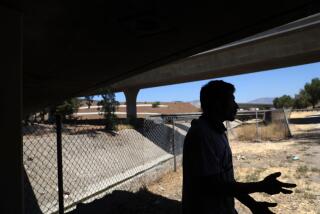Amid debate, Colorado Springs may join cities banning panhandling
Colorado Springs, Colo., city officials want to put their collective foot down on a major public headache: panhandling.
Officials in the community south of Denver are poised to outlaw solicitations for cash in a 12-square block area of downtown. The city council this week gave preliminary approval to an ordinance to outlaw various forms of solicitation and the measure is expected to receive final approval Nov. 27.
But Colorado Springs may be headed into some rough legal waters.
Cities large and small nationwide have resorted to the citation book to deal with the issue of homeless people who flag pedestrians and drivers with imploring -- and sometimes humorous -- signs, or sometimes with just an extended hand.
But in a growing number of cases, civil rights groups -- and the panhandlers themselves -- have sued on 1st Amendment grounds.
And the courts appear to be listening.
In Utah earlier this month, the city of American Fork agreed not to enforce its anti-panhandling law after a homeless man who had been cited several times for holding a sign on public sidewalks filed a federal lawsuit claiming the rule selectively barred free speech.
A civil liberties foundation in that state sued American Fork in October on behalf of Steve Ray Evans, claiming the law âdiscriminates among types of speechâ and âdepends solely on a person expressing the âwrongâ words.â
âIn order to bring in enough money to survive, Evans sometimes engages in panhandling,â according to the ruling. âHe has found holding a sign to be an effective means of communicating with people. He does not approach or speak to people unless invited to do so.â
American Forkâs case against Evans was dismissed and the city paid him $750 in damages. The city also agreed to reimburse $5,327.76 in attorney fees and court costs, according to the Salt Lake City Tribune.
Following Evansâ lawsuit, Salt Lake City decided to stop enforcing the state statute, which makes it illegal to âsit, stand or loiter on or near a roadwayâ in order to solicit a ride, money, employment or other business. A federal judge later ruled the law was unconstitutional and shouldnât be enforced.
A recent report by the National Law Center on Homelessness and Poverty found a 7% rise nationwide between 2009 and 2011 in the number of communities that passed anti-panhandling laws. The study included 188 cities.
Colorado Springs officials expanded a no-soliciting zone from 6 feet to 20 feet from building entrances downtown and banned soliciting along state highways.
But ACLU officials in Colorado say they have seen the Colorado Springs statute and warn that itâs illegal.
âThe city attorneyâs office sent me a draft of the new law several months ago and solicited my thoughts,â Mark Silverstein, the ACLUâs legal director in Colorado, told the Los Angeles Times. âI told them as it was written, the ordinance was very clearly a violation of the 1st Amendment.â
He added, âOne obvious flaw is that it violates the 1st Amendment principal that government canât choose certain speech it likes while forbidding speech it doesnât like.â
Under the Colorado Springs law, Silverstein said, a person can stand on a downtown street with a sign that reads âRe-elect the mayorâ but not one that solicits for breast cancer research. As written, the law also prohibits a Salvation Army Santa from ringing a bell for donations during the holidays or a street musician playing with an open guitar case.
âThey want to stop aggressive panhandling but the law strikes down passive non-threatening polite panhandling and every other variety of speech,â he said.
Silverstein said he shared his opinions with city officials by email, adding, âI didnât get a response.â
Colorado Springs City Attorney Chris Melcher told The Times that the city has studied the issue for nearly eight years. In recent months, officials have held five public hearings, consulted hundreds of people, and decided that the future of the cityâs downtown depended on a new get-tough law.
He says he does not recall his office sending a draft of the ordinance, adding he is open to their input.
âWhat people have failed to say is that these ordinances have also been upheld in communities nationwide,â Melcher said, pointing out that the city had based the language for its law on a similar code in Fort Lauderdale, Fla., which has been upheld on appeal.
âWe know what weâre doing,â he said. âWeâve done the research.â
ALSO:
Long Island utility executive resigns
Pilots flying to safety meeting die in crash
Jury rules âcode of silenceâ protected felon cop
More to Read
Sign up for Essential California
The most important California stories and recommendations in your inbox every morning.
You may occasionally receive promotional content from the Los Angeles Times.











